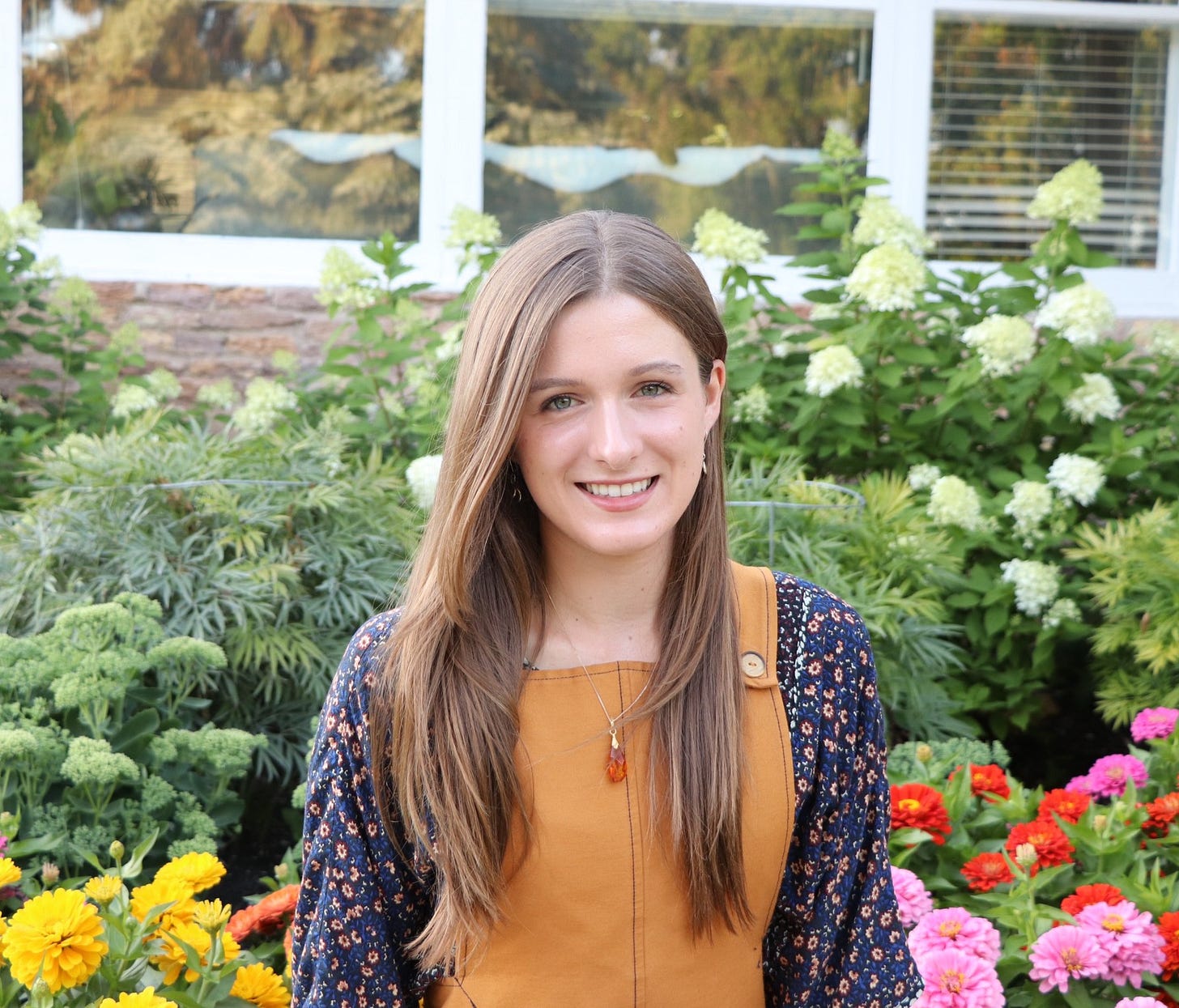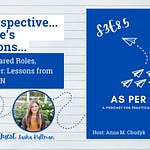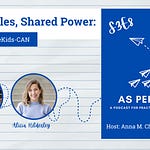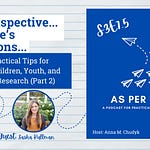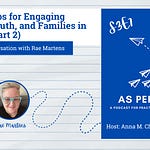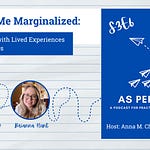Episode summary
In this onePERspective episode of asPERusual, doctoral trainee Sasha Kullman shares how her journey in patient engagement in research has transformed her understanding of what it means to be a researcher. Building on the insights shared by Rae Martens in Season 2 Episode 5 of asPERusual, Sasha discusses how viewing engagement as a psychosocial, relational practice has shaped both her professional growth and personal identity. She emphasizes the power of co-creation, the importance of mentorship, and the value of relationship-building in research. Through personal reflection, Sasha invites listeners to consider how strong relationships—not just expertise—are the true foundation of meaningful patient engagement.
Meet our guest listener
Sasha Kullman: Sasha is a PhD student in the College of Pharmacy at the University of Manitoba, supervised by Dr. Anna Chudyk. She holds a master’s degree from the Faculty of Kinesiology and Recreation Management at the same institution, where her research focused on health psychology, health promotion, and patient engagement in research. Funded by a CIHR Canada Graduate Scholarship, Sasha’s doctoral work continues to center on participatory approaches, involving patients and their families in research designed to enhance healthcare experiences.
Episode Transcript:
Anna Chudyk:
Hi everyone! Welcome to onePERspective — a bi-weekly segment where a featured guest shares their key reflections on the latest episode of asPERusual, my podcast all about practical patient engagement in research. I’m your host, Anna Chudyk.
Joining me again today is Sasha Kullman, a doctoral trainee in my lab. Sasha, I’m really looking forward to hearing your thoughts on Season 3, Episode 5 of asPERusual, which provides an overview of the Family Engagement in Research Program (FER) and explores how patient engagement is not just a methodological tool, but a deeply psychosocial, relational practice.
Sasha Kullman:
Hi everyone, and welcome back to asPERusual. I’m Sasha, a doctoral student in the College of Pharmacy at the University of Manitoba, and I’m really grateful to be with you again for this mini episode. As Anna mentioned, my research focuses on patient engagement, and as part of that, I’m lucky to be working directly with youth and families.
One of my personal goals throughout my PhD is to grow as a facilitator of meaningful patient engagement. I want to do work where the voices, insights, and priorities of patients and families actually shape the research, not just at the end, but from the very beginning.
In the last episode, we heard from Rae Martens, a knowledge broker with the Family Engagement in Research, or FER, program. Rae shared so many insights that really stuck with me, both personally and professionally.
One point Rae made that really resonated was the idea that engagement is a psychosocial practice; that it impacts all of us mentally, emotionally, socially, and even spiritually. And this way of thinking about engagement has really helped me make sense of my own growth over the last couple of years, as I’ve gotten more involved in this space.
When I first started doing research as an undergrad, I had this idea that being a researcher meant having all the answers. That the ultimate goal was to become a super expert in one very specific area, and that getting there was a pretty solitary process. I didn’t really understand how research worked back then, but I did feel like one day I was going to need to have all the answers, which was honestly a pretty intimidating thought.
But then I met Anna, and I started learning about engagement. And that completely shifted how I understood research, and who gets to be involved in it. I realized that research doesn’t have to be a lonely pursuit. In fact, it often becomes better when we bring together researchers, patients, families, and community members. We each hold pieces of the puzzle, and together, we can start to see a fuller picture of whatever issue we’re exploring.
This shift in perspective also helped me see myself differently. I’ve always loved working with people, listening, learning, and building relationships together, and I wasn’t sure how I could bring those qualities with me into my role as a researcher at first. But discovering the engagement space felt like finding my niche. It showed me that there is a place in research for that kind of connection, and that those strengths can really contribute to the process.
One of the things I love most about my job is helping facilitate engagement with patient and family partners. I love the collaboration. I love showing up with a million questions and knowing I don’t have to figure everything out alone. That we get to figure it out together.
For example, this week I’ll be meeting with our youth and parent advisory groups to talk about how we should co-develop a mental health study. I’m coming with questions, but I know that the answers will emerge from conversation, not from me sitting alone at my desk.
Rae said something that really stuck with me: “We are a community, and when we don’t understand, we reach out and ask questions.” I think that captures so much of what makes the engagement space feel different. There’s no expectation that any one person will have all the answers. Instead, there’s an understanding that we grow stronger by learning from each other.
And this way of working, this collaborative, relational approach, has changed me. I find myself reading research articles and actively looking for the patient or family perspective. I find myself constantly asking, Whose voices are shaping this decision? or Whose voices are missing?
As Anna and Rae discussed, I think once you’ve experienced the power of doing research with people, not just about them, it’s really hard to imagine going back.
That said, I also want to acknowledge that a huge part of why I’m so passionate about this work is because of the mentorship I’ve received. From the daily guidance I get from Anna to the lessons I’ve learned from working alongside experienced patient and family partners, all of this has really shaped me as a student. Without that support, I wouldn’t have even known where to start.
And that’s why I think programs like FER are so important. They make engagement in research feel possible. They give both researchers and patient/family partners the tools and confidence to do this work meaningfully. They show us that engagement isn’t about checking boxes or earning credentials, it’s about building relationships. And that’s something Rae said in the episode that really stood out: “It’s not about accreditation, it’s about relationship building.”
That’s exactly how I see my PhD journey too. It’s not about becoming a researcher. It’s about learning how to build strong, trusting, long, term relationships. That’s the heart of engagement. And I’m really glad that programs like FER help bring that heart to the forefront.
Point to Ponder
So I want to close with a question that I’ve been thinking about, and maybe it’s something you can carry into your own work this week:
Which relationships in your work do you value the most? What makes those relationships strong? And how can we continue to show appreciation for the people we’re in those relationships with?
Thanks for spending a few minutes with me today. I’ll see you in the next episode.
Anna:
Thanks so much, Sasha! Such a great reflection, and I love how you always close with thought-provoking questions. For myself personally, I always value the relationships that feel safe, reciprocal, and nurturing — both inside and outside of work. And I try to show appreciation through my words and actions, as guided by how patient partners tell me I can best show them that I appreciate them. Regardless of the context, it’s important to figure out people’s preferred love languages, if you will.
In the next full episode of asPERusual, I sit down with Sunday Queskekapow (a Two-Spirit Swampy Cree advocate, consultant, and Gladue Writer) and Briana Hunt (a Patient Engagement Coordinator at the Children’s Hospital Research Institute of Manitoba) to discuss the emotional, spiritual, and systemic dimensions of engaging children, youth, and families with lived and living experience of sensitive topics such as homelessness.
As always please be sure to head over to our website at asperusual.substack.com where you can find previous episodes, check out interactive transcripts, and subscribe to our newsletter. And if you haven’t already, please subscribe to the podcast, and leave a positive review, wherever you like to listen — it really helps others find us too.
You can always reach me directly at anna.asperusual@gmail.com, or connect with me on LinkedIn by searching for Anna M. Chudyk — that’s C-H-U-D-Y-K. You can add Sasha to LinkedIn by searching for Sasha Kullman - K-U-L-L-M-A-N.
Thanks again for listening — and until next time, let’s keep working together to make patient engagement in research the standard… or asPERusual.




